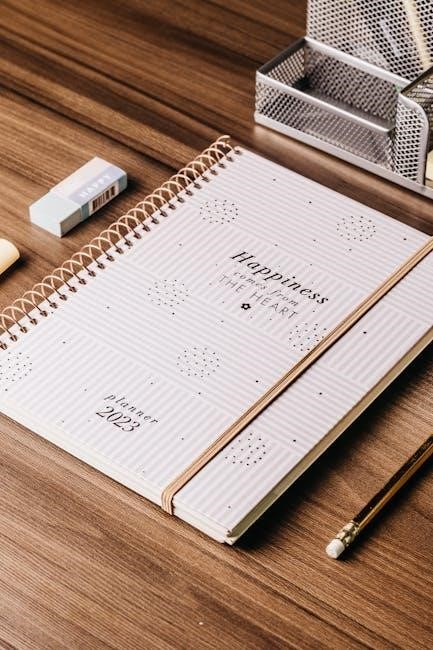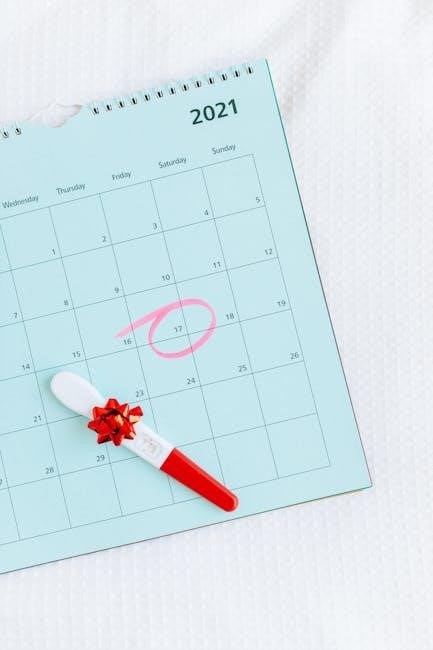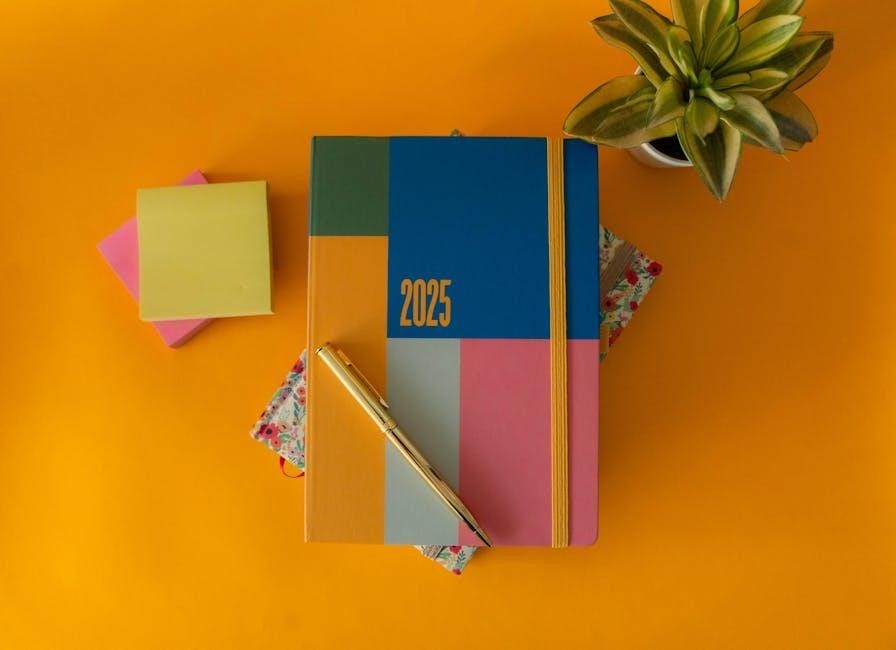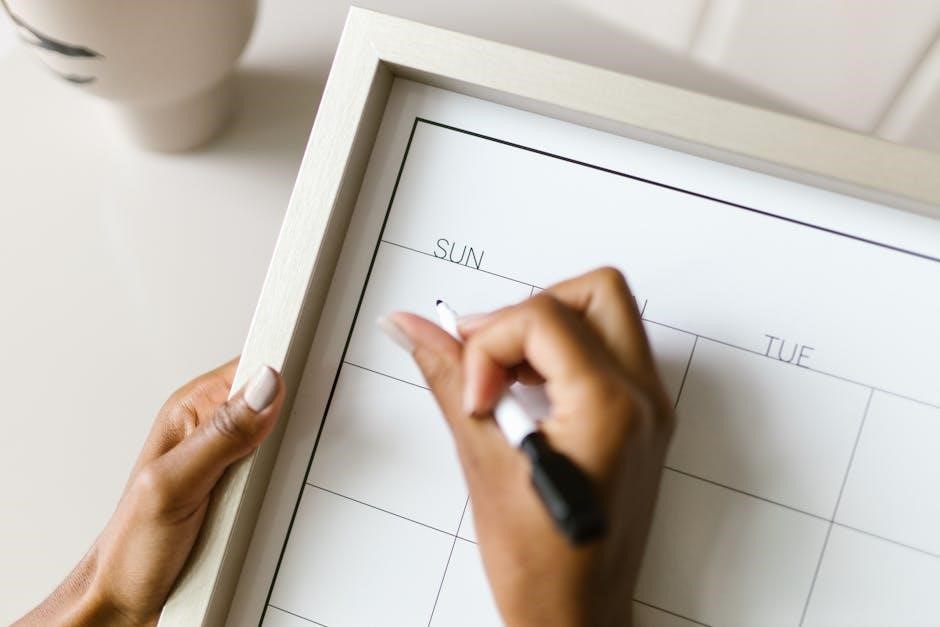puppy schedule 8 weeks pdf
8-Week-Old Puppy Schedule: A Comprehensive Guide
Bringing an 8-week-old puppy into your home is an exciting time! Establishing a structured daily schedule is crucial for their development. This guide provides insights into creating a routine that encompasses feeding, potty training, sleep, socialization, and basic training. A consistent schedule will help your puppy thrive.
Importance of a Schedule for an 8-Week-Old Puppy
Establishing a schedule for your 8-week-old puppy is paramount for fostering good habits and ensuring a smooth transition into their new home. Like human babies, puppies thrive on routine. A well-structured schedule provides predictability, which reduces anxiety and promotes a sense of security. Consistency in feeding times, potty breaks, and sleep patterns helps regulate their bodily functions and establish healthy habits from the outset.
A consistent schedule facilitates effective potty training. Taking your puppy outside at regular intervals, especially after waking up, eating, and playing, helps them learn to associate specific times and places with eliminating. This reduces accidents inside the house and accelerates the potty-training process.
Furthermore, a schedule aids in crate training. By associating the crate with positive experiences, such as meals and naps, and incorporating it into their daily routine, puppies learn to view it as a safe and comfortable den. This can be invaluable for housetraining, preventing destructive behavior, and providing a secure space when you’re unable to supervise them directly.
Moreover, a schedule supports socialization. Introducing your puppy to various sights, sounds, and experiences in a controlled and positive manner during their critical socialization period (up to 16 weeks) is essential for developing a well-adjusted and confident dog. A structured schedule allows you to plan and incorporate these socialization exercises effectively.
Finally, a schedule is crucial for basic training. Short, frequent training sessions incorporated into their daily routine will help your puppy learn basic commands and develop good manners. Consistency and positive reinforcement are key to success, and a schedule ensures that training is a regular part of their day. A predictable routine is essential in their first few weeks.
Feeding Schedule for an 8-Week-Old Puppy
An 8-week-old puppy requires frequent, small meals to support their rapid growth and high energy levels. Typically, you should feed your puppy four times a day until they reach three months of age. Spacing these meals evenly throughout the day helps maintain consistent energy levels and aids in digestion. A sample feeding schedule could be at 7:00 AM, 12:00 PM, 5:00 PM, and 10:00 PM.
It’s crucial to use high-quality puppy food specifically formulated for their age and breed size. These foods contain the necessary nutrients, vitamins, and minerals to support healthy development. Consult with your veterinarian to determine the appropriate amount of food to give your puppy at each meal, as this can vary depending on the brand and your puppy’s individual needs.
Always provide fresh, clean water for your puppy to drink. Water should be available at all times, especially after meals and during playtime. Avoid leaving food out for extended periods, as this can lead to overeating and weight gain. Instead, offer the designated amount of food at each mealtime and remove any uneaten food after 20-30 minutes.
Establish a consistent feeding routine by feeding your puppy in the same location and at the same times each day. This helps create a sense of predictability and security. It’s also important to monitor your puppy’s weight and body condition regularly. If you notice any significant changes, consult with your veterinarian to adjust their feeding schedule or food type as needed. Remember to take them outside to potty after each feeding.
As your puppy grows, you will gradually reduce the number of meals per day. Between 3 and 6 months, you can decrease feeding to three times a day, and after 6 months, you can transition to twice-daily feedings, which is common for many adult dogs.
Potty Training Schedule and Frequency
Potty training an 8-week-old puppy requires diligence and a consistent schedule. Due to their small bladders, puppies at this age need frequent potty breaks, typically every one to two hours during the day and every three to four hours overnight. Establishing a regular potty schedule from the first day is crucial for success.
Take your puppy outside to a designated potty spot immediately after waking up, after meals, after naps, and after playtime. Consistency is key, so always use the same spot in your yard. Use a verbal cue, such as “go potty,” to associate the action with the command.
Reward your puppy immediately with praise and a small treat when they eliminate in the designated spot. Positive reinforcement helps them understand what you want them to do. Clean up any accidents inside the house thoroughly with an enzymatic cleaner to eliminate odors and prevent repeat offenses.
Watch for signs that your puppy needs to go outside, such as circling, sniffing, squatting, or whining. If you see any of these signs, take them outside immediately. Crate training can also aid in potty training, as puppies are less likely to eliminate in their crate.
Over the next few weeks, gradually increase the time between potty breaks as your puppy gains bladder control. However, always err on the side of caution and take them out frequently, especially after meals or naps. Patience is essential, as accidents are inevitable. Remember, consistency and positive reinforcement are the keys to successful potty training.
Nighttime potty breaks are also necessary for young puppies. Set an alarm for every 3-4 hours to take your puppy outside to eliminate. As they get older, they will be able to hold it for longer periods overnight.
Sleep Schedule and Napping Habits
An 8-week-old puppy requires a significant amount of sleep to support their rapid growth and development. Expect your puppy to sleep approximately 18 to 20 hours per day. This sleep is not continuous; it’s broken up into frequent naps throughout the day and a longer stretch at night.
Establishing a consistent sleep schedule is crucial for your puppy’s well-being. A regular sleep routine helps regulate their body clock and prevents overtiredness, which can lead to behavioral issues. Create a comfortable and quiet sleeping space for your puppy, such as a crate or a designated bed.
Encourage napping by providing a calming environment. When you notice your puppy getting tired, gently guide them to their sleeping area. Avoid stimulating activities before naptime. A consistent bedtime routine can also help signal that it’s time to sleep. This could include a short walk, a potty break, and some quiet cuddle time.
Puppies often fall asleep after playtime or meals. Observe your puppy’s behavior to identify their sleep cues, such as yawning, circling, or becoming less responsive. Respond promptly to these cues to prevent them from becoming overtired.
During the day, puppies typically nap for one to two hours at a time. At night, they may sleep for longer stretches, but expect to wake up for potty breaks every few hours. As your puppy grows, their sleep patterns will gradually change. However, maintaining a consistent sleep schedule will continue to benefit their overall health and behavior.
Crate Training Integration
Crate training is a valuable tool for housebreaking, providing security, and managing your 8-week-old puppy. When properly introduced, the crate becomes a safe and comfortable den for your puppy. It’s essential to integrate crate training gradually and positively into your puppy’s daily schedule.
Start by making the crate inviting. Place soft bedding, toys, and treats inside to create a positive association. Encourage your puppy to enter the crate voluntarily by tossing treats inside. Never force your puppy into the crate, as this can create anxiety and fear.
Begin with short crate sessions. Initially, confine your puppy for just a few minutes at a time, gradually increasing the duration as they become more comfortable; Supervise your puppy during these sessions to ensure they don’t become distressed.
Associate the crate with positive experiences. Feed your puppy meals inside the crate to create a pleasant association. Provide chew toys to keep them occupied and entertained. Use a calm and reassuring voice when interacting with your puppy near the crate.
Incorporate crate time into your puppy’s nap schedule. After playtime or a potty break, gently guide your puppy into the crate for a nap. This helps them associate the crate with rest and relaxation.
Never use the crate as punishment. The crate should be a safe haven for your puppy, not a place of fear or confinement. If your puppy whines or barks in the crate, avoid responding immediately, as this can reinforce the behavior. Instead, wait for a moment of silence before letting them out.
Consistency is key to successful crate training. Stick to a regular crate schedule to help your puppy adjust and feel secure.
Socialization Exercises in the First Week
The first week with your 8-week-old puppy is a critical period for socialization. Exposing your puppy to various sights, sounds, people, and environments during this time can significantly impact their future behavior and temperament. Socialization should be a positive and gradual process, ensuring your puppy feels safe and comfortable throughout each experience.
Start with controlled and gentle introductions. Expose your puppy to different surfaces like grass, carpet, and tile. Introduce them to household sounds such as the vacuum cleaner, television, and washing machine, keeping the volume low initially.
Introduce your puppy to different people, including men, women, and children. Ensure all interactions are gentle and positive, with people offering treats and speaking in a calm voice. Supervise interactions closely to prevent overwhelming your puppy.
Take your puppy on short walks in quiet areas, allowing them to explore their surroundings. Expose them to different sights, such as cars, bicycles, and other animals from a safe distance. Always keep your puppy on a leash and monitor their reactions closely.
Enroll your puppy in a puppy socialization class. These classes provide a safe and structured environment for puppies to interact with one another under the guidance of a qualified trainer.
Remember to keep socialization sessions short and positive. Observe your puppy for signs of stress or fear, such as panting, trembling, or hiding. If your puppy shows signs of discomfort, remove them from the situation and try again later at a slower pace.
Positive reinforcement is key to successful socialization. Reward your puppy with treats, praise, and affection for displaying calm and confident behavior in new situations.
Training Schedule: What to Teach at 8 Weeks
An 8-week-old puppy is like a sponge, ready to absorb new information. Start with basic commands using positive reinforcement techniques. Keep training sessions short, fun, and engaging, lasting no more than 5-10 minutes at a time. Consistency and patience are essential for success.
Begin with simple commands like “sit,” “stay,” “come,” and “down.” Use treats and praise to reward your puppy when they perform the desired behavior. Break down each command into small, manageable steps, gradually increasing the difficulty as your puppy progresses.
Introduce your puppy to their name and use it frequently during training sessions. Associate their name with positive experiences, such as giving them treats or petting them. This will help them learn to respond when called.
Potty training is a crucial aspect of puppy training. Establish a regular potty schedule and take your puppy outside frequently, especially after waking up, eating, and playing. Reward them with praise and a treat when they eliminate outside.
Crate training can also be introduced at this age. Make the crate a comfortable and safe space for your puppy by placing soft bedding and toys inside. Gradually increase the amount of time your puppy spends in the crate, rewarding them for staying calm and relaxed.
Leash training can begin with short walks in a quiet area. Get your puppy used to wearing a collar and leash, and reward them for walking nicely beside you.
Focus on socialization during training sessions by exposing your puppy to different sights, sounds, and people. This will help them develop into a well-adjusted and confident adult dog.
Remember to keep training positive and avoid using punishment or harsh corrections. Positive reinforcement methods are more effective and will help build a strong bond between you and your puppy.
Adjusting the Schedule as the Puppy Grows

As your puppy grows, their needs will change, and their schedule should adapt accordingly. What works at 8 weeks may not be suitable at 12 weeks or beyond. Observe your puppy’s behavior and adjust the schedule to meet their evolving requirements.
Feeding schedules will need to be modified as your puppy matures. Gradually decrease the frequency of meals while increasing the portion size. Consult with your veterinarian to determine the appropriate feeding schedule and food amount for your puppy’s breed and size.
Potty training frequency can also be adjusted as your puppy gains better bladder control. Extend the intervals between potty breaks, but continue to provide ample opportunities for them to eliminate outside.
Nap times may become shorter and less frequent as your puppy’s energy levels increase. However, it’s still essential to ensure they get enough rest to prevent overstimulation and exhaustion.
Training sessions can become longer and more challenging as your puppy learns new commands and skills. Introduce more complex exercises and gradually increase the duration of training sessions.
Socialization opportunities should continue throughout your puppy’s development. Expose them to a variety of people, places, and experiences to help them become well-adjusted and confident adults.
As your puppy grows, they may require more exercise and playtime. Provide them with plenty of opportunities to run, play, and explore in a safe and supervised environment.
Regular veterinary checkups are crucial to monitor your puppy’s health and development. Your veterinarian can provide guidance on adjusting the schedule and addressing any health concerns that may arise.
Be flexible and adapt to your puppy’s individual needs. Every puppy is different, and what works for one may not work for another. Observe your puppy’s behavior and adjust the schedule accordingly to ensure their well-being.

Common Challenges and Mistakes
Raising an 8-week-old puppy comes with its set of challenges. One common mistake is inconsistency. A fluctuating schedule can confuse the puppy, hindering potty training and overall routine establishment. Stick to the schedule as closely as possible, even on weekends;
Another challenge is unrealistic expectations. Puppies have small bladders and limited attention spans. Accidents will happen, and training will take time. Patience and positive reinforcement are key. Avoid punishment, as it can create fear and anxiety.
Overfeeding is another common mistake. Follow the veterinarian’s recommended feeding guidelines and avoid giving too many treats. Obesity can lead to health problems later in life.
Lack of socialization can also be detrimental. Expose your puppy to various sights, sounds, people, and dogs in a safe and controlled manner. This helps them develop into well-adjusted adults.
Ignoring signs of illness can lead to serious health issues. Monitor your puppy for any changes in appetite, energy levels, or behavior. Contact your veterinarian if you have any concerns.
Inadequate crate training can lead to anxiety and resistance. Make the crate a positive and comfortable space for your puppy. Never use it as punishment.
Failing to puppy-proof the home can result in accidents and injuries. Remove any potential hazards, such as electrical cords, toxic substances, and small objects that can be swallowed.
Neglecting mental stimulation can lead to boredom and destructive behaviors. Provide your puppy with puzzle toys, training games, and opportunities to explore their environment.
Comparing your puppy to others can lead to frustration. Every puppy develops at their own pace. Focus on your puppy’s progress and celebrate their achievements.
Seeking professional help when needed is crucial. If you are struggling with any aspect of puppy care, consult with a veterinarian, trainer, or behaviorist.
Sample Daily Schedule for an 8-Week-Old Puppy
Here’s a sample daily schedule to guide you, remember flexibility is important!
6:00 AM: Wake up, immediately take the puppy outside for a potty break. Praise and reward successful elimination.
6:15 AM: Breakfast. Offer puppy food according to the veterinarian’s recommendations.
6:30 AM: Playtime and basic training. Keep sessions short and engaging (5-10 minutes). Focus on simple commands like “sit” and “come.”
7:30 AM: Potty break. Take the puppy outside, even if they don’t seem to need to go.
8:00 AM: Naptime in the crate. Provide a comfortable bed and a chew toy.
10:00 AM: Wake up, potty break.
10:15 AM: Playtime and socialization. Introduce the puppy to new sights, sounds, and people in a safe and controlled environment.
11:00 AM: Potty break.
11:30 AM: Lunch.
12:00 PM: Naptime.
2:00 PM: Wake up, potty break.
2:15 PM: Training session. Review previously learned commands and introduce new ones.

3:00 PM: Potty break.
3:30 PM: Playtime.
5:00 PM: Potty break.
5:30 PM: Dinner.
6:00 PM: Potty break.
6:30 PM: Quiet playtime and cuddle time.
7:30 PM: Potty break.
8:00 PM: Final potty break before bedtime.
8:30 PM: Bedtime in the crate.
10:00 PM: Potty break (middle of the night).
This schedule needs adjusting to fit your puppy’s individual needs and your lifestyle. Observe your puppy’s cues and adapt accordingly. Consistency is key to success!


